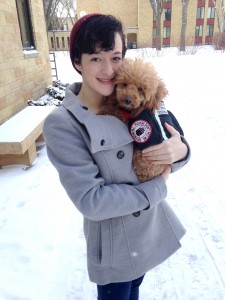He is small, quiet and very hard working. He’s been living at Concordia for a little over two months now, and can usually be found lying under chairs or on the lap of his best friend, Liz Bartels.
His name is Donny and he is a service dog.
Bartels received Donny to help her with a medical condition shortly after Thanksgiving, and he has lived in Brown Hall ever since. Bartels said she filled out paperwork through Concordia’s website and met with Disability Services to do an interview before Donny was granted access to campus.

There are two different categories of animals that Concordia permits on campus to assist their owners: ser- vice and assistance animals. Service animals do specific tasks for their owners and assistance animals are generally used for emotional sup- port. Both types are allowed in cam- pus dorms and apartments, but only service animals are granted public access.
Senior Michaila Gerlach ad- opted Athena, a 12-year-old black and brown assistance cat, about a month ago. She said after a number of things happened in her personal life involving family, she experi- enced large amounts of stress and an inability to focus during classes.
When she went home over break, she found that her cat Mickey helped her to feel more calm and relaxed.
Gerlach asked her therapist in Moorhead about the option of get- ting an assistance cat, and her ther- apist noted that her co-worker was looking for someone to take her cat. She suggested that Gerlach adopt the cat.
“It just kind of worked out that I needed a cat and the cat need- ed a home,” Gerlach said.
Like Bartels, Gerlach filled out paperwork and then met with Moni- ca Kersting of Disability Services for about an hour to go through an eval- uation. Gerlach said that her coun- selor had filled out paperwork with information about why an assistance animal would benefit her, so she did not have to justify her condition. In- stead, she said that Kersting asked her about any other accommoda- tions that could be made to help her, and she found out that she could use audiobooks to help her focus.
“The whole process went smoother than I expected it to,” Ger- lach said.
Gerlach also met with Resi- dence Life to sign some forms that “basically said I was going to take care of the cat and not let it wander around and take out the litter and other tasks you do for pets.” Gerlach doesn’t have a roommate, but she said that if she did then she would have had to discuss it with that per- son and make arrangements.
Every day, Gerlach leaves Athena with water and food for the day and returns after classes. Donny the doxiepoo, on the other hand, ac- companies Bartels everywhere.
Service animals can be trained for a wide number of tasks. They can lead blind individuals, alert those who are hard of hear- ing, pull a wheelchair, assist an in- dividual during a seizure, alert their owners of the presence of allergens, retrieve items such as medicine or the telephone and help with balance and stability, just to name a few.
Concordia’s Service & Assis- tance Animal Policy permits dogs as service animals and has several requirements for them. The dog should respond to voice or hand
commands at all times, be under the control of the handler and remain on a leash. According to Bartels, the leash can be somewhat cumber- some.
“Since you always have to have them on a leash, it’s like you lost a hand,” Bartels said. “In DS, I have to go back twice — once for food and once for silverware and a drink.”
Concordia’s animal policy provides several guidelines on ani- mal etiquette. For instance, a dog must not block an aisle or passage- way for fire egress, sniff people or display any behaviors or noises that are disruptive.
“I think he’s barked five times in his life,” Bartels said. “One time, a kind of sketchy person was walking toward me and I didn’t know what he was going to talk to me about and Donny barked so loud. But usually, he’s very quiet.”
The dog must also wear a commonly recognized identifying symbol and remain unobtrusive to others. This is not difficult for Don- ny, who sits quietly in Bartels’s lap or under her chair in class.
“He has gotten stepped on in DS so he usually prefers to be out of the way,” Bartels said.
Donny also sports a dark blue vest, with “Please don’t pet me: I’m working” written in bold letters on the side. The latest addition to his vest is two strips of glow-in-the-dark tape that allows people to see him in the dark. This proved especially use- ful when Bartels worked backstage for Concordia’s latest play, “Perfect Arrangement.”
Despite the fact that Donny underwent two years of behavioral and specified training with a han- dler, he did not receive his vest from the state or federal government. Service dogs do not receive certifi- cation. A doctor can prescribe assis- tance animals, but there is no official service dog registry.
Bartels said this is an issue because people can buy vests online and claim that their dogs are service animals.
“When their dogs misbehave, people expect service dogs to do the same,” Bartels said. “Or they have
negative attitudes toward [service dogs],”
A few public places have asked Bartels to prove that Donny was a service dog before allowing them to enter.
“At Wal-Mart, someone did want me to prove that he was a ser- vice dog and the Americans with Disabilities Act states they can’t do that,” Bartels said. “At a medical place, someone has told me to show the paperwork and there is no pa- perwork.”
Bartels said she has not ex- perienced any access challenges at Concordia. When applying to have a service animal on-campus, Concor- dia typically only inquires about the animal’s role in regard to its owner. The college usually will not ask about the nature or extent of a per- son’s disability and does not require documentation of the animal.
After Donny was approved, Bartels was given a triple in Brown to herself, though she didn’t ask for it.
“I asked if it was because of Donny and they said no,” Bartels said, who was told that she could have a roommate as long as the roommate was okay with it. But as of now, it’s just the pair of them. When Bartels gets free time in the evenings to relax in her room, Donny does too.
“It’s not all work and no play,” Bartels said, smiling.
When Donny is off duty, Bar- tels’ friends can come over and pet him and he will lie in their laps. Dur- ing other times in the day, Bartels stresses that people should ask her permission before touching him and not call out to him.
“It’s just generally not a good idea to distract a service dog,” Bartels said. “They may miss an alert. He’s a fancy piece of medi- cal equipment,” Bartels said. “And you wouldn’t fiddle with someone’s wheelchair or oxygen tank.”
After Bartels’ friends leave and she lies down for bed, her loyal companion never strays far.
“Donny sleeps right above my head.” Bartels said.






Be First to Comment